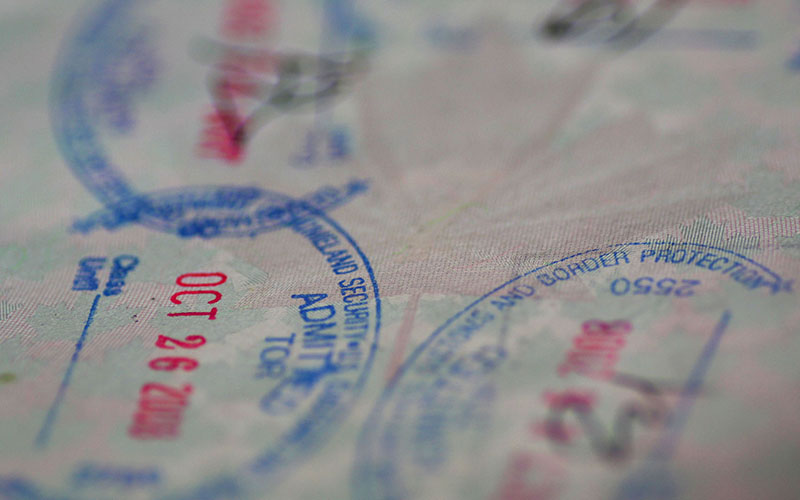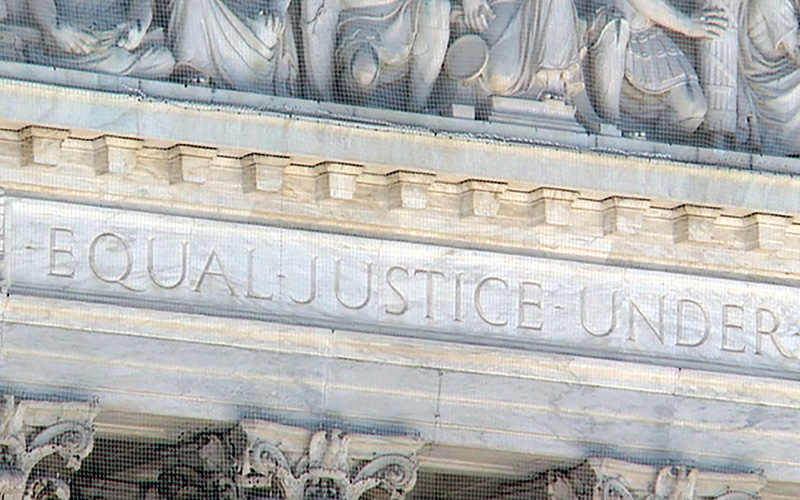
President Donald Trump signed an executive order restricting travel from specific countries, and temporarily banning all refugees to the U.S., within a week of taking office, but it has been blocked in the courts since then. (Photo by Allan Caplan/Creative Commons)

The Supreme Court handed President Donald Trump a partial victory on his travel ban, letting it move forward in some instances, but blocking its use against foreign travelers with “bona fide” links to the U.S., like jobs or family here. (Photo by Nathan O’Neal/Cronkite News)
WASHINGTON – The Supreme Court said Monday that the Trump administration can proceed, for now, with a limited version of its restrictions on refugees and travelers from six majority-Muslim countries, a ban that critics called at thinly veiled Muslim ban.
The restrictions, signed by President Donald Trump within a week of his inauguration in January, were quickly challenged and almost immediately blocked by federal courts.
The Supreme Court lifted those injunctions in part Monday, but said the ban cannot be applied to foreign travelers with “bona fide” connections to the U.S., like a job, schooling or a relative here, among other criteria. It also said it will hear arguments in the case when its next term starts in October.
Both sides of the debate saw something positive to take away from the court’s decision.
Rep. Paul Gosar R-Prescott, said it should “bring Americans a great sense of comfort.”
“I supported thorough vetting of high-risk populations form the outset,” Gosar said in social media posts Monday. “This court decision is a step in the right direction and a victory for the United States of America.”
Rep. Andy Biggs R-Gilbert, released a statement saying he was “pleased” with the court’s decision “to remove the unconstitutional stay on most of President Trump’s executive order.”
Others, like university officials in Arizona, welcomed the court’s decision to exempt travelers like students from the ban.
“ASU does not anticipate today’s Supreme Court ruling will impact students from the six countries included in the Executive Order, as the ruling specifically states that individuals who have a formal relationship with a university are excluded from the travel ban,” Arizona State University President Michael Crow said in a statement Monday.
That was echoed by statement from officials at Northern Arizona University and the University of Arizona. The Arizona Board of Regents said in a statement that it does not believe the ruling will “impact students” from the effected countries.
Trump said in a statement that the court’s decision is “a clear victory for our national security. It allows the travel suspension for the six terror-prone countries and the refugee suspension to become largely effective.”
The six “terror-prone” countries named in the executive order are Iran, Libya, Somalia, Sudan, Syria and Yemen. They would have travel suspended for 90 days to give the Department of Homeland Security to evaluate the system of vetting travelers from those countries.
Homeland Security said in a statement Monday that it would consult with the departments of Justice and State before proceeding to implement the order “professionally, with clear and sufficient public notice, particularly to potentially affected travelers.”
But opponents of the proposal vowed to continue to fight.
-Cronkite News video by Emma Lockhart
“We will never give up defending the rights of those who are affected by this discriminatory executive order,” said Becca Heller, director of the International Refugees Assistance Project, one of the parties in the Supreme Court case.
“We hope that the Supreme Court will ultimately uphold the ruling of judges across the country and declare the travel ban unconstitutional and discriminatory in nature,” Heller said.
Omar Jadwat, director of the American Civil Liberties Union’s Immigrants’ Rights Project, said the court now has the opportunity to “permanently strike it (the ban) down.”
“President Trump’s Muslim ban violates the fundamental constitutional principle that government cannot favor or disfavor any one religion,” Jadwat said in a statement. “Courts have repeatedly blocked this indefensible and discriminatory ban.”
But the high court Monday said it would only block the ban for now for people or institutions in the U.S., who would suffer “concrete hardship” if the travel ban kept out someone they had a relationship with. That is not the case for travelers with no ties to the U.S., the court said.
“When it comes to refugees who lack any such connection to the United Statess, for reasons we have set out, the balance tips in favor of the government’s compelling need to provide for the nation’s security,” the court’s decision said.
Mark Hetfield, president and CEO of the Hebrew Immigrant Aid Society, said Trump’s order reminds him of a time when Jewish refugees were turned away to tragic result.
“For the American Jewish community, this hearkens back to our darkest days of the 1920s to 1940s, when America last broke with its tradition of welcoming refugees by imposing discriminatory and tragic admissions criteria based entirely on where people were born,” Hetfield said in a statement Monday. “The results of those discriminatory laws and policies, particularly for those trying to escape the Nazi genocide in Europe, were tragic.”
Hetfield said the latest order “will also have tragic results, demonstrating that we have forgotten the lessons we learned.”